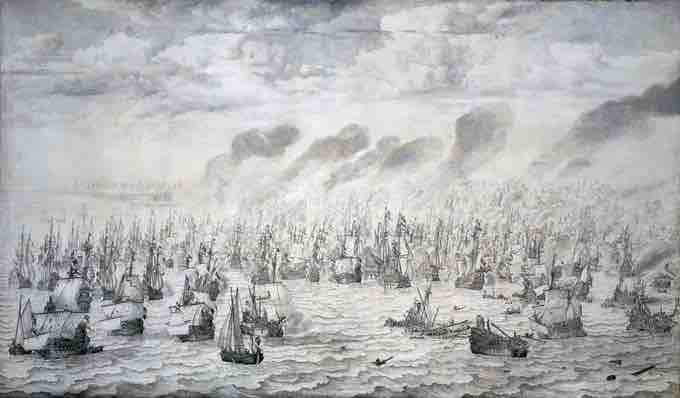Overview
Mercantilism was an economic doctrine which held that a nation's power depended on the value of its exports, and so the government must control all foreign trade. Under mercantilism, nations sought to establish colonies to produce goods for export as a chief means of acquiring economic strength and power. Essentially, mercantilists believed that colonies existed not for the benefit of settlers, but for the benefit of the home country.
For Britain, the goal of mercantilism was to run trade surpluses to increase the flow of gold and silver pouring into London. The government took its share through duties and taxes with the remainder going to merchants in Britain. The government spent much of its revenue on the Royal Navy, which not only protected the British colonies but threatened and sometimes seized the colonies of other European empires in the Americas.

The Battle of Terheide, 10 August 1653, by Willem van de Velde, 1657
This image illustrates a battle fought at sea during the Anglo-Dutch Wars. Control of trade routes was a primary factor leading up to the war, and England's mercantilist policies were a major factor that shaped this desire to control trade routes.
Controlling Trade and Promoting Exports
Trade Barriers, Regulations, Tarriffs, and Subsidies
British mercantilism mainly took the form of efforts to control trade. A wide array of regulations was put in place to encourage exports and discourage imports, thereby increasing the nation's profit. The colonies were captive markets for British industry; the ultimate goal was to enrich the mother country. Under British mercantilism, the government and the merchants became partners with the goal of increasing political power and private wealth, to the exclusion of other empires. The government protected its merchants—and kept others out—through trade barriers, regulations, and subsidies to domestic industries in order to maximize exports and minimize imports into the realm. A tariff was placed on imports and a bounty given for exports, while the export of some raw materials was banned completely. The government had to fight smuggling—which became a favorite American technique in the 18th century to circumvent the restrictions against trading with the French, Spanish, or Dutch.
The Navigation Acts
Throughout the 17th and 18th centuries, the Parliament of England passed the Navigation Acts to increase the profit England derived from its colonies. Among the provisions, the Acts required that any colonial imports or exports travel only on ships registered in England. The colonies could not import anything manufactured outside of England unless the goods were first taken to England, where taxes were paid. The colonies were forbidden to export tobacco and sugar to any nation other than England. The Navigation Acts expelled foreign merchants from England's domestic trade. Once under British control, regulations were imposed on the colonies that allowed the colony to produce only raw materials and to trade only with Britain.
Many colonists resented the Navigation Acts because they increased regulation and reduced their opportunities for profit, while England profited from colonial work. This led to friction between colonists and mainland England; indeed, these mercantilist policies (such as forbidding trade with other empires and controls over smuggling) were a major irritant that would contribute to the American Revolution.